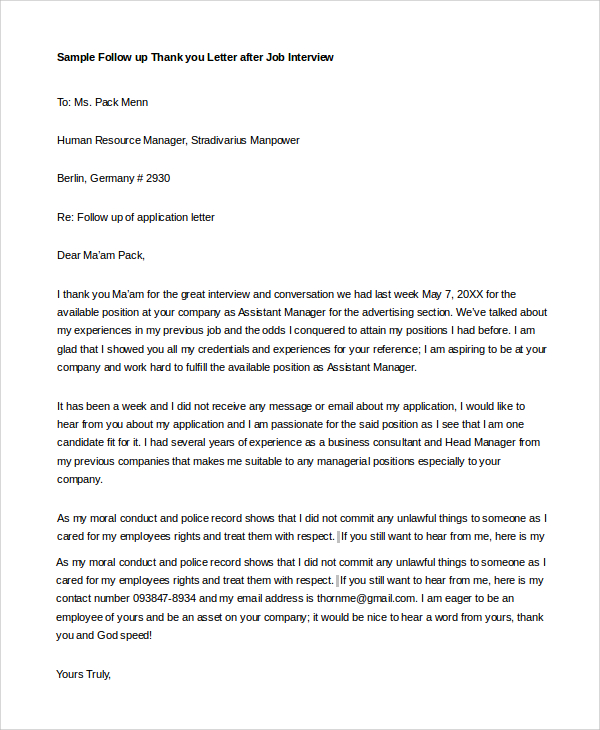
- Interview follow up letter how to#
- Interview follow up letter update#
- Interview follow up letter professional#
Write your follow-up letter using a block format, where the entire text is left-aligned and single-spaced. Here are the steps you should take to write an impactful follow-up letter: 1. Why you are a strong candidate: Include a brief summary of the benefits you could offer the company and what you would specifically bring to the position.ĭetails you forgot in the interview: If there were any important details you forgot to include in your application or failed to mention during your phone screening or interview, you should include them in your follow-up letter. Reminder of who you are: Include details to help the hiring manager remember which candidate you were, as it's possible they spoke with dozens of candidates interested in the position. They are:Īppreciation: The most important thing to include in your follow-up letter is an appreciation for the interviewer's time and consideration. There are four things you should always include in a follow-up letter.


Interview follow up letter how to#
Related: How To Make a Good Impression After Your Interview What to include in a follow-up letter If the company shares that they don't intend to have a decision for a month, for example, wait and send your follow-up note closer to that time.
Interview follow up letter update#
If the company intends to hire someone relatively soon, you may want to send a follow-up email asking if there is an update a few days or a week after your initial follow-up letter. If you are following up to ask for an update on the hiring process, when you send it depends on the timeline for the hiring process. If the time frame is longer than a few weeks, you could print out your letter and send it by postal mail. If your interviewer indicated that the time frame to make their decision is coming up quickly, then it would be better for you to send your follow-up letter as an email. You should always send it within 24 hours of the contact. Timing is important when you are sending a follow-up letter expressing your appreciation for the opportunity to interview. If you aren't hired for this specific position, if you stand out as a strong candidate to the hiring manager, they may consider you for another position at a later date. A follow-up letter could even help your resume get a second look if it was initially passed over.įinally, it helps to remind the hiring manager who you are, helping you to stand out as a candidate. Sending a follow-up letter reconfirms your interest in the position and allows you to check on the status of your application. It also allows you to mention anything you forgot to say during your interview and reiterate why you believe you are the ideal fit for the job.

First, it shows good manners and professionalism. Whether you decide to send a follow-up letter that is printed out or by email, here are multiple reasons why a follow-up letter is important. Related: How to Ask Someone to Be Your Reference: Email Examples Why is a follow-up letter important?
Interview follow up letter professional#
Taylor discusses the critical moments to follow up with an employer and how to construct a professional email when the time is right. Related: Ultimate Guide To Following Up: After Job Application, Interview and No Response


 0 kommentar(er)
0 kommentar(er)
